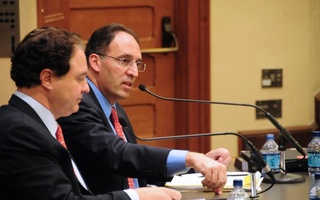WASHINGTON--As a scholar of presidential success and failure, Littauer Professor of Public Administration Richard E. Neustadt watches the Nicaraguan aid debate unfold and wonders where it all will end.
"The president's rhetoric is going to make this harder and harder and harder, because this rhetoric says if this goes, it's dominoes; if this goes, Mexico goes," Neustadt says.
For the professor, there are familiar echoes--failures such as the Bay of Pigs and Vietnam, and successes such as the Cuban missile crisis.
Looking ahead to Thursday's House vote on President Reagan's $100 million aid package for the Nicaraguan rebels, Neustadt said Reagan might score a political victory "but it really is threatening to set us up on a course that is endless," a course he said could involve the United States in Latin American revolutions for years to come.
Neustadt's observations on the Nicaraguan debate come from the experience of a career spent studying presidential decisions--what went right and what went wrong and what could be learned from history.
In a new book, "Thinking in Time, The Uses of History for Decision Makers," Neustadt and historian Ernest R. May examine presidential decisions in events from Franklin D. Roosevelt through Reagan.
They cite John F. Kennedy's handling of the Cuban missile crisis and the Social Security compromise during Reagan's first term as success stories. Horror stories are more common, and include Vietnam, the Bay of Pigs invasion, President Carter's aborted arms control initiative in 1977 and his handling of the report of a Soviet combat brigade in Cuba in 1979.
In their preface, Neustadt and May acknowledge that many of the failures they cite occurred in the Carter years.
"Some readers are apt to think us unduly hard on the Carter administration," they wrote. "We go back and back to the Carter years like somebody tonguing a sensitive tooth."
They described Carter as a president whose "awareness of history was limited."
The Bay of Pigs invasion in 1961, in which a force of 2000 Cuban exiles, trained by the Central Intelligence Agency, landed on the island and were swiftly defeated and captured, was described by Neustadt and May as "the classic case of presumptions unexamined."
It was an instance in which Kennedy and his advisers failed to question such assumptions as their belief that the Cuban people would rise up against the government of Fidel Castro when the exiles invaded, the authors said.
Administration support of the Contras in Nicaragua often is compared with the Bay of Pigs.
In an interview, Neustadt cited the likely influence on Reagan of the "loss of China" in the 1950s when communist forces drove the nationalist government into exile on Taiwan.
That change, he said, "affected Lyndon Johnson on Vietnam," made him determined not to allow the communists another Asian victory.
Read more in News
Students Riot at 'Cliffe Quad; Five Undergraduates ArrestedRecommended Articles
-
Knocking Heads TogetherWhen Sen. Edward M. Kennedy '54 (D-Mass.) marched proudly through the Kennedy School of Government and Sanders Theater on Tuesday,
-
Carter's PeopleRonald Reagan is dangerous, John B. Anderson is out of it, and Jimmy Carter hasn't really been all that bad--a
-
Professors Call Carter An Apt PupilPresident Carter's first year seems to have been primarily a learning experience, according to an informal poll of Harvard faculty
-
Pei Named as Architect For Kennedy LibraryIeoh Ming Pei, a New York architect, will design the John F. Kennedy Memorial Library, its trustees announced yesterday. The
-
 Alums Battle to Fill Kennedy Senate Seat
Alums Battle to Fill Kennedy Senate Seat -
Students Spread Campaign FeverAs the Nov. date for the Massachusetts gubernatorial election fast approaches, many Harvard students and recent graduates find themselves swept up in the excitement of a faceoff featuring two alumni: Democratic incumbent Deval L. Patrick ’78 and Republican challenger Charles D. Baker ’79.













